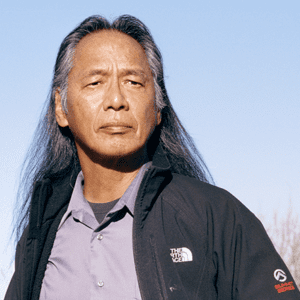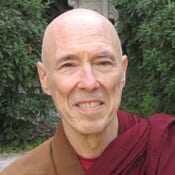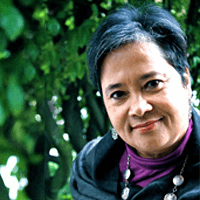Resources
Among many gifts, the Dharma invites us to contemplate View. Through our way of looking, we ascribe value, define ethics and pursue outcomes. From conception comes perception which in turn drives experience. Our individual and collective narratives have the power to nourish, integrate and inspire. They can also reduce, separate and deplete. Our stories bring us together, and they can tear us apart. It might be argued that the ecological crises we face arise to a significant degree from our distortions, our misunderstanding of reality. Dharma practice invites us to investigate not only the perceived but the perceiver and the perceiving itself.
In this session, we have the rare opportunity to hear from leaders who are shining a critical light on the way dominant Western culture perceives and values the world and how it operates to negate or destroy other ways of knowing. In seeing how we see, new ways, more live-affirming and holistic, might become available.
Session Leaders
Special Guest

Ron His Horse is Thunder is is a member of the Hunkpapa-Lakota Oyate. He served as the tribal chairman of the Standing Rock Sioux Tribe from 2005 – 2009. Ron is the great-great grandson of One Bull, the nephew and adopted son of Sitting Bull, the Hunkpapa Lakota Nation Chief. He served as president of Sitting Bull College (formally Standing Rock College), as a commissioner for the Higher Learning Commission for the North Central Accreditation for Schools and Colleges and as a member of the boards of the American Indian Higher Education Consortium and the North Dakota Tribal College Association. In 2002, President George W. Bush appointed him as Chairman of the President’s Board of Advisors on Tribal Colleges and Universities; he continues to serve today. Former Chairman His Horse Is Thunder received his juris doctor degree in 1988 from the University of South Dakota, School of Law. In 1985, he earned a bachelor of science degree from Black Hills State University. Former Chairman His Horse Is Thunder is married to Deborah Wetsit-His Horse Is Thunder.
Session Teachers

Venerable Bhikkhu Bodhi is an American Buddhist monk and translator of Pali Buddhist texts. He is also the founding chair of Buddhist Global Relief, an organization dedicated to helping communities worldwide afflicted with chronic hunger and malnutrition. He was appointed editor of the Buddhist Publication Society (in Sri Lanka) in 1984 and its president in 1988. Ven. Bodhi has many important publications to his credit, either as author, translator, or editor, including the Buddha — A Translation of the Majjhima Nikaya (co-translated with Ven. Bhikkhu Nanamoli (1995), The Connected Discourses of the Buddha — a New Translation of the Samyutta Nikaya (2000), and In the Buddha’s Words (2005).

Bonnie Duran has been practicing mindfulness meditation since 1982. She has taken teachings from western teachers including Joseph Goldstein and Marcia Rose, as well as Tibetan teachers Venerable Tsoknyi Rinpoche and Lama Zopa Rinpoche. She is one of the founders of The People of Color Sangha in Albuquerque, New Mexico, and in Seattle, Washington; is a graduate of the Spirit Rock teacher training program and Community Dharma Leader 3 training program at Spirit Rock Meditation Center. Bonnie is also involved in Native American spiritual practices and traditions. She is a contributor to Hilda Guitierrez Baldoquin’s book, Dharma, Color and Culture: New Voices in Western Buddhism (Parallax), and has written for the Turning Wheel Journal of Engaged Buddhism..
Homework for Session Three
- Handout from Ven. Bhikkhu Bodhi [download id=”8572″]
- Article, Ron His Horse Is Thunder Speaks Out on Standing Rock
- Video, Epistimicide
Access the Webinar
[time-restrict on=”2017/10/15″ off=”2017/10/15 14:30:00″]
- The live session begins [localize_time tz=”America/Los_Angeles” fmt=”l, F j, Y g:i a T”]Sunday, October 15, 2017 9:30 am [/localize_time].
- Add this meeting and the full the series to Google Calendar, Outlook or other .ics-compatible calendar.
- To prepare for the live session, ensure that you have downloaded and installed the latest version of Zoom to your PC, Mac, iPhone, or android device. This program is free and will allow you to see and hear the webinar. You’ll also be able to ask questions and interact with the session leaders. You might run the program and choose the option to test your audio and video (if you have a webcam) to make sure everything is working.
- You may join the session up to 30 minutes before the meeting begins. At that time, the link and further instructions on how to join the webinar will appear on this page.
You’ll be taken into the live session once it begins.
If you don’t have a good internet connection, either for video or audio, you can still join by phone:
- One-click: +16468769923,,481234991# or +16699006833,,481234991#
- US: +1 646 876 9923 or +1 669 900 6833 or +1 408 638 0968
- Enter the webinar ID: 481 234 991
- International numbers are available here.
To raise your hand, ask a question, or connect by phone during the session, use the buttons provided on the zoom interface:
[/time-restrict][time-restrict on=”2017/10/15 14:40:00″]
There are three resources of interest that pertain directly to the session.
- Venerable Bihkkhu Bodhi’s [download id=”8572″] (PDF)
- Slideset [download id=”8608″] (PDF)
- The video on epistimicide that Bonnie showed is also given above under “homework”
To view the video in full screen, click the expand button ![]() on the lower right.
on the lower right.
[/time-restrict]
Practices
Each session will feature inquiries that you can explore on your own in meditation or with others in dyads, triads or larger groups. We’ll post basic instructions and the inquiries immediately following the live session.
[time-restrict on=”2017/10/15 0:00:00″]
Here we offer some optional (but highly recommended!) exercises to help you integrate some of the ideas and practices presented in the session. Each inquiry may be practiced individually or in dyads, triads or even larger groups. If the practice of meditative inquiries or group inquiry is new to you, we offer some guidance and suggestions here.
Inversion of Value
- What have I been trained to value in myself and in the world?
- What has this way of valuing cost me?
- What feels deeper and truer than this way of valuing?
- Are there places in my life where I could align myself with these deeper values?
Epistemology and Perception
For many in the modern West, the dominant way of knowing is what we might call “Scientific Materialism,” a rational, analytical and perhaps reductionist way of knowing. From quarks to galaxies, this way of seeing conditions a compositional, mechanistic perception of reality.
- What is it like to perceive through this lens? What’s included and what’s excluded? What is beautiful and inspiring about it? What is ignored or devalued?
- How do I perceive myself, other people, and other beings through this lens?
- In particular, what aspects of myself and others are devalued or denied when I hold to this way of knowing as the only truth?
- What other ways of knowing reality are available to me and what truth and beauty do they reveal?
Potential Follow Up:
Tune into one of your senses that is not so deeply entwined with the dominant way of knowing in your culture. In the West, the sense of sight is strongly connected with the dominant way of knowing of scientific materialism. The sense of hearing or touch may offer access to a different way of knowing. Whatever sense you choose, spend some time attuning to it and then explore the following questions:
- What is it like to perceive through this sense? What’s included and what’s excluded?
- How do I perceive myself, other people, and other beings through this sense?
- Specifically, what is revealed that I have been taught not to perceive?
Share Your Experience
After you’ve done any/all of these inquiries, we invite you to share your experience and engage in conversation with one another in the community discussion below.[/time-restrict]
Follow Up Resources
- Website recommended by Venerable Bhikkhu Bodhi: The Next System Project
- Article Dr. Bonnie Duran on Race, Racism, & the Dharma
- Article by Ron His Horse is Thunder: Racism in the Dakotas – Can you hear me now?
- Article, The Protector: Deborah His Horse is Thunder
- Book on the origins of a dominant culture delusion: The Spell of the Sensuous, by David Abram
Support Session Leaders
To maximize participation, we are offering this series at minimal cost. In addition, all of the teachers and leaders on these calls offer their gifts freely in this spirit of dana.
If you value what is offered here, we invite you to support these leaders and you may also wish to support One Earth Sangha. Dana, or generosity, is considered an essential part of practice and situates us in the unbroken line that seeks to bring the gifts of Buddhadharma, wisdom and compassion, to our world.
Any amount you offer, no matter how small, is greatly appreciated.
Community Discussion
We invite you to share with the community your reflections on any aspect of the session: the webinar, homework, practices, follow up resources or anything else!
